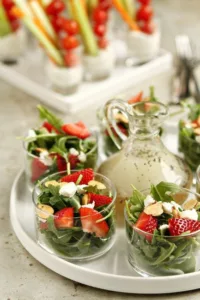There was a simpler time when no one had special food needs, and brides could base their menu around meat, potatoes, pasta, bread and vegetables. Today, however, it is impossible to get a group of people together without having at least one person that has special dietary needs. Whether it is a vegetarian or vegan, a food allergy or a need for gluten-free foods, planning a menu for your wedding should take into consideration, when possible, the potential food needs of your guests.
Vegetarian Options
The most common special diet today is the vegetarian or vegan diet. Vegetarian and vegan eaters range anywhere from eating no animal products at all (vegan) to only eating eggs, milk, and cheese, while some vegetarians may eat fish from time to time to supplement their protein. When you are planning your menu, if you know that you will have guests that prefer a vegetarian or vegan meal, make sure that your options are broader than the traditional “beef, chicken or fish.” Include a meat-free pasta or a salad with lots of vegetables. When deciding between a served, sit-down meal or a buffet, the buffet option can be more inclusive for vegetarian and vegan options. Buffets can offer a variety of dishes from carved meats to salads, potatoes, pasta and vegetables. This is an easy way to accommodate a wide variety of foods and dietary needs.
Gluten-Free
Meeting the needs of gluten-free eaters can be both challenging and simple at the same time. Gluten is a mixture of proteins that is present in grains such as wheat, barley, and rye. For individuals that avoid gluten for health reasons or as a dietary choice, foods like bread, flour tortillas, pasta, and cakes and pastries are off the table. In some respects, this can be challenging if you want to have an Italian meal with different types of pasta, and an array of traditional desserts and baked goods. On the flipside, the gluten-free diet can essentially be a meat, potatoes and vegetables diet, and this means that if your menu has plenty of the basics your gluten-free guests will be happy.
Food Allergies
Food allergies are a touchy subject. Many people don’t want to talk about being allergic to things like nuts or shellfish. However, depending on how severe an individual’s allergy is, eating food that has an allergen can either be a mildly irritating or life threatening. A good rule of thumb when planning your wedding meal is to avoid foods like crab, oysters, shrimp, scallops and nuts. Keeping these off the menu will ensure that a person with a food allergy won’t come into contact with a food that could cause a medical emergency.
Feeding the Kids
Unless you are planning an adults only affair, the likelihood is good that you are going to have a few kids helping you celebrate your big day. Most kids aren’t going to jump to eat the prime rib or chicken dish. Foods like French fries, macaroni and cheese, chicken tenders and simple fruits and vegetables are great kid friendly foods. Keeping little tummies full means that the kids at your wedding will be willing to hang out longer without complaints of being hungry, which means their parents will stay and enjoy the party longer too.
When You Have Dietary Limitations
If you are the person with the special diet needs and unless your whole community of friends and family are vegetarian or gluten-free, make sure that you build a menu that is going to make the majority of guests happy. Your carnivore family and friends aren’t likely to be excited about a whole meal of vegetarian or vegan foods. While this may be your typical diet, and you should have a meal that makes you happy, don’t forget that your guests are more likely to enjoy the party longer if they aren’t hungry.
Creating a reception menu that covers a variety of dietary needs can be challenging. When it comes down to what works, remember to keep it simple. Even if your guests don’t have special dietary needs, that really amazing, trendy dish with all sorts of odd ingredients, may not go over well. Try to keep your menu to foods that the majority of people are going to enjoy. Not sure how to make this work? Work with the wedding planners at your reception venue or your caterer. They are the experts at making sure your menu is as inclusive as possible.


